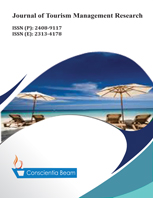Exploring the factors influencing low-carbon travel: Evidence from Taiwan
DOI:
https://doi.org/10.18488/31.v11i2.3895Abstract
This study aims to explore how low-carbon travel intentions are influenced by numerous factors such as low-carbon literacy, environmental attitudes and perceived behavioural control. The study obtained 615 valid samples through a questionnaire survey and employed confirmatory factor analysis to evaluate the reliability and validity of the constructs. Hypotheses were tested using a linear structural equation model. The mediating effect of low-carbon travel intention was assessed and different models were compared through nested model analysis. The results show that under partially mediating models, environmental attitudes and low-carbon literacy significantly impact low-carbon travel through low-carbon travel intentions but perceived behavioral control directly influences low-carbon travel. These insights are significant for tourism operators in formulating strategies and marketing promotions, helping to more accurately target audiences and promote the widespread adoption of low-carbon tourism.

